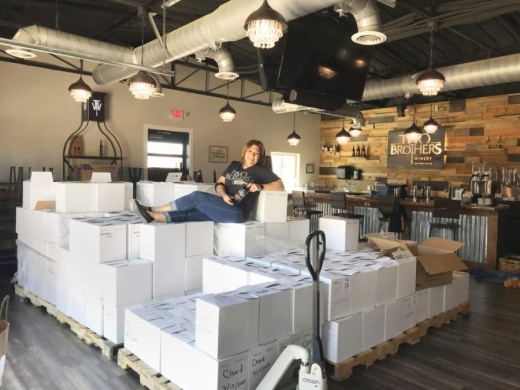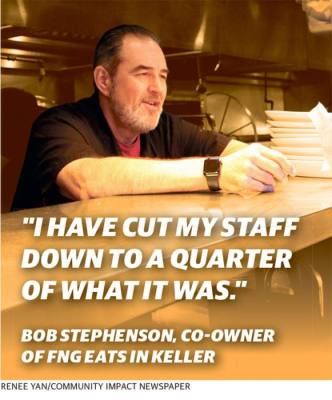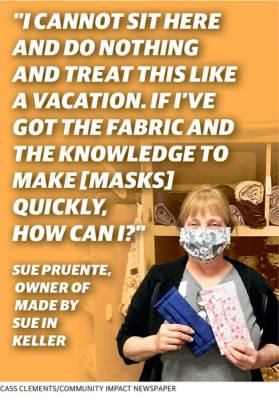Co-owner Donna Kirwood said the winery continues to make wine but has cut back hours and shifted to curbside pickup and to-go options as well as delivery, Kirkwood said. She said she is also experimenting with wine pairings for local restaurants and virtual tastings to stay engaged with the community.
“We have to stay positive,” Kirkwood said. “You are either going to let it take you down or make you better.”
Businesses large and small across Keller, Roanoke and Northeast Fort Worth are looking at how to stay afloat amid various shelter-in-place orders.
A majority of the more than 1,200 respondents to a city of Fort Worth survey on effects from the coronavirus in late March reported revenue decreases of more than 80%, said Robert Sturns, the city’s economic development director.
“A lot of small businesses do not have the wherewithal to operate more than 30 days without income coming in,” Sturns said.
The survival of small businesses is essential to the nation’s ability to regain footing once this crisis is over, said Paul Nichols, executive director of the Institute for Innovation and Entrepreneurship at The University of Texas at Dallas.
“They can throttle up a lot quicker,” he said. “The problem, though, is that they also don’t have the resources of a juggernaut, so they tend to throttle down a lot faster, too.”
The two main federal relief efforts—the Paycheck Protection Program and the Economic Injury Disaster Loan—ran out of money in early April, according to the U.S. Small Business Administration. Additional funding for businesses was still being discussed as of press time April 22.
Nichols said it is important that business owners focus on finding the relief that is right for them.
“They need to really be spending some time reading and researching because these are things that are changing by the day,” he said.
It is all about settling into a “new normal,” said Chris Wells, co-owner of The Classic Cafe in Roanoke.
A staple of the Unique Dining Capital of Texas since the mid-1990s, The Classic Cafe was forced to go from white-tablecloth fine dining to curbside pickup and delivery within three days, Wells said.
Staff have implemented a number of procedures. No one is allowed inside the building, staff have sequestered themselves, and all products delivered by vendors are sanitized, Wells said. Six-foot social distancing and other guidelines are also being observed for curbside and pickup orders.
“There is no guidebook here,” Wells said.
Companies of all sizes have been forced to reinvent themselves in the wake of the crisis.
Made By Sue in Keller aims to make 10,000 cotton face masks to help reduce the risk of spreading the virus, owner Sue Pruente said. The shop has received a number of donations so it can provide face masks for fire departments, large offices and even family members at Dyess Air Force Base, she said.
“I cannot sit here and do nothing and treat this like a vacation,” Pruente said. “If I’ve got the fabric and the knowledge to make them quickly, how can I?”
The Hey Sugar candy store in Roanoke has found some success with new services, according to Lindsay Anderson, Hey Sugar’s director of operations. Popular items have included do-it-yourself waffle kits, featuring two cones, a pint of ice cream, sprinkles and spoons, and Easter baskets, Anderson said.
With unemployment claims 32 times higher than they were at this time last year, according to the April 4 Federal Reserve Economic Data, protecting the local workforce is especially crucial, officials said.
But many industries are struggling. The National Restaurant Association has estimated that more than 688,000 restaurant employees in Texas have been laid off or furloughed in connection with the outbreak, according to an April 20 news release.
The lack of events at the Texas Motor Speedway has cut business at the nearby Comfort Suites in Roanoke in half, co-owner Tina Patel said. And although employees are willing to work, there are fewer shifts to go around, she said.
One silver lining is long-term tenants, who make up about 25% of the 88-room hotel’s current clientele.
Patel has also instituted a number of changes to cut costs, including not renting the top floor of the three-story building. Housekeeping services have been limited to upon-request only, and select high-dollar items, such as Greek yogurt, have been removed as breakfast options.
“I have been in the hotel business a little over 15 years, and I have never seen anything like this,” Patel said.
The biggest impact for Bob Stephenson, co-owner of FnG Eats in Keller, has been on staff, he said.
“I have cut my staff down to a quarter of what it was,” he said. “I had 45 employees.”
But with adversity comes new ideas, he said.
“We went through something similar with 9/11,” Stephenson said. “We had to think about how we could be more efficient with what we do and still be able to take care of the guest.”
Leaning on Stephenson’s background in Italian cooking, the restaurant has broadened its menu and is now offering a full list of take-and-bake options along with a soup of the day.
The Greater Keller Chamber of Commerce has launched several campaigns to support businesses. The latest is a T-shirt fundraiser. T-shirts with the slogan, “Eat Local. Shop Local. Spend Local. Enjoy Keller,” and the names and logos of nearly 40 businesses and individuals are being sold to benefit the community, according to the chamber.
Together, the various efforts will make a difference, Keller Mayor Pat McGrail said.
“I believe in the innovation and integrity of this community,” he said. “I believe in our passion to serve one another, and I believe in our ability to get through anything.”
Olivia Lueckemeyer contributed to this report.







